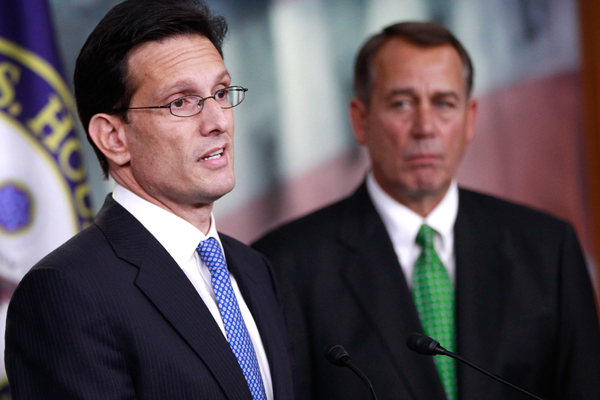Have House Republicans lost their mojo? That’s the first conclusion that jumps to mind when attempting to read the tea leaves of the current negotiations over extending the payroll tax cut. On Tuesday, the most popular word used to describe the House GOP’s purported decision to abandon requiring spending cuts to offset the cost of another extension of the payroll tax cut was “cave.”
Ouch. A full two weeks before the ultimate deadline, Republicans are already willing to cut a deal that will add another $100 billion to the deficit. It wasn’t so long ago that these same Republicans were playing last-second brinksmanship while threatening to shut down the federal government in fervent protest of Big Government. Since when did the Tea Party become so meek?
If the consensus reporting from Capitol Hill is correct, sometime in the next two days, Republicans and Democrats will agree on a deal that keeps the payroll tax cut in place, extends unemployment benefits (albeit with a gradual reduction in the length of benefits put into place) and, once again, protects doctors from a cut in their Medicare reimbursement rate. The unemployment benefits and the so-called doc fix will purportedly be paid for by a combination of wireless spectrum sales, tweaks to how much the federal government contributes to federal worker pensions, and cash carved out of the health reform deal.
The politics of this are a lot easier to figure out than the economics. Simply put: It’s a win for Obama. The White House avoids putting the brakes on economic growth by preventing an imminent tax hike and keeping the safety net more or less intact for unemployed workers. In the run-up to an election that may be largely decided by the performance of the economy over the summer, that’s huge. If Republicans, as some have suggested, wanted to tank the economy to ensure new occupants in the White House, this is not the way to go about it.
And as a bonus, at least for the moment, the White House has also managed to avoid another game of budget showdown chicken. That said, the House has yet to vote, and over the past two years we’ve witnessed several occasions in which recalcitrant conservative representatives have torpedoed deals that were supposedly set in place. On the other hand, it’s possible that the negative political consequences of the 10 percent approval rating currently “enjoyed” by House Republicans is beginning to sink in.
Economically, the deal doesn’t do anything to additionally stimulate the economy, it merely keeps in place measures that have already been enacted. The maximum length of eligibility for unemployment benefits will gradually contract, a process that will cause hardship for workers who drop through the safety net. But macroeconomically speaking, the effect isn’t going to be that huge. Nor will the offsets that pay for the unemployment extensions and the doc fix add up to much in the way of contractionary austerity, though it certainly won’t be pleasant for federal workers who may end having to contribute more to their own pensions.
All in all, it’s kind of a wash. The White House avoids sabotaging the economy, the Republicans avoid making themselves any more unpopular than they already are. It’s a sign of just how dysfunctional Washington has been over the last couple of years that the absence of drama seems like a masterful political stroke by Obama. Maybe, as James Fallows suggests, he really is learning how to be president.

